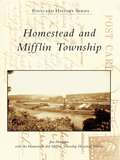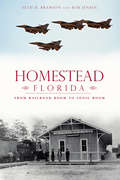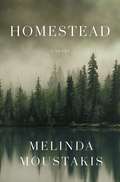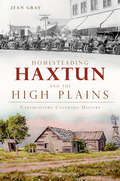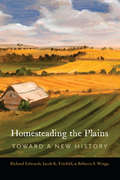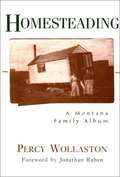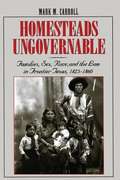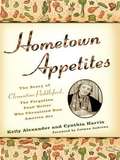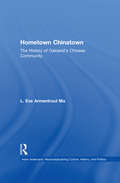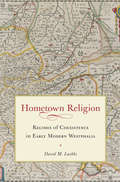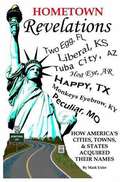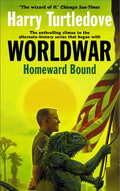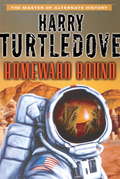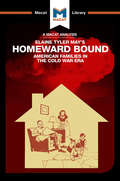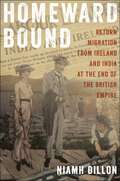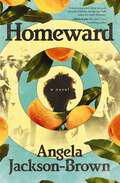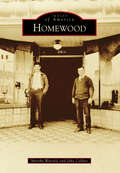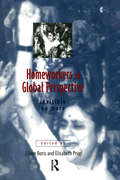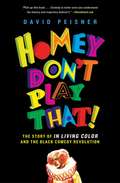- Table View
- List View
Homestead Steel Mill–the Final Ten Years: USWA Local 1397 and the Fight for Union Democracy
by Staughton Lynd Mike Stout JoAnn WypijewskiFrom the famous strike of 1892, through the century-long fight for a union and union democracy,Homestead Steel Mill is a case history on the vitality of organized labor in the twentieth century. Written outside the halls of academia, fellow worker and musician Mike Stout sets the record straight with Homestead Steel Mill—the Final Ten Years: USWA Local 1397 and the Fight for Union Democracy. This is an insider's portrait of the union at the U.S. Steel's Homestead Works, specifically the workers, activists, and insurgents that made up the radically democratic Rank and File Caucus from 1977 to 1987. Developing its own "inside-outside" approach to unionism, the Rank and File Caucus drastically expanded their sphere of influence so that, in addition to fighting for their own rights as workers, they fought to help stop the closures of other steel plants, opposed U.S. imperialism in Central America, fought for civil rights, and built strategic coalitions with local environmental groups. Mike Stout skillfully chronicles his experience in the takeover and restructuring of the union's grievance procedure at Homestead by regular workers and put at the service of its thousands of members. Stout writes with raw honesty and pulls no punches when recounting the many foibles and setbacks he experienced along the way. The Rank and File Caucus was a profound experiment in democracy that was aided by the 1397 Rank and File newspaper—an ultimate expression of truth, democracy, and free speech that guaranteed every union member a valuable voice. Profusely illustrated with dozens of photographs, Homestead Steel Mill—the Final Ten Years is labor history at its best. Mike Stout has provided a vivid account of how ordinary workers can radicalize their unions.
Homestead and Mifflin Township
by Homestead and Mifflin Township Historical Society Jim HartmanHomestead and Mifflin Township shows an era of days gone by through the medium of postcards. Mifflin Township was one of the seven original townships when Allegheny County was formed, and it covered the Monongahela River as well as the present-day communities of Clairton, Duquesne, Dravosburg, Hays, Homestead, Jefferson Hills, Lincoln Place, Munhall, Pleasant Hills, West Elizabeth, West Homestead, West Mifflin, and Whitaker. The original Mifflin Township ran along the Monongahela River from Hays (Six Mile Ferry) to present-day West Elizabeth. The area began as a quiet farming community in the 1850s but had become a great industrial steel giant by the dawn of the 20th century. Local steel mills produced vast quantities of rail, structural steel, and armaments for both world wars. This collection shows Homestead and Mifflin Township's industrial achievements, architecture, and places of entertainment.
Homestead, Florida: From Railroad Boom to Sonic Boom (Brief History)
by Seth H. Bramson Bob JensenOriginally settled prior to the coming of the Florida East Coast Railway in 1904, Homestead became only the second incorporated municipality in Dade County in 1913. A land of rich soil steeped in agricultural heritage, the area soon grew into a marvelously diverse city of more than sixty thousand residents. The foundation laid by the railroad gave way to the aviation industry when the city became home to Homestead Air Force Base, now Homestead Air Reserve Base. The city has also dealt with adversity, rebuilding itself from the devastation of Hurricane Andrew in 1992. Homestead is now the gateway to two national parks and is home to Homestead-Miami Speedway, a unique winery and a thriving business community. Join authors Seth H. Bramson and Bob Jensen as they detail the rich history of this South Florida gem.
Homestead: A Novel
by Melinda MoustakisFrom NATIONAL BOOK FOUNDATION 5 UNDER 35 HONOREE and FLANNERY O'CONNOR AWARD WINNER Melinda Moustakis, a debut novel set in Alaska, about the turbulent marriage of two unlikely homesteaders“A beautiful novel, quiet as a snowfall, warm as a glowing wood stove…Admirers of Marilynne Robinson and Alice Munro are bound to appreciate.” —NPR“Spare and exquisite, tough and lovely. The sentences build on themselves, becoming expansive and staggering in their sweep.” —The New York Times Book ReviewAnchorage, 1956. When Marie and Lawrence first lock eyes at the Moose Lodge, they are immediately drawn together. But when they decide to marry, days later, they are more in love with the prospect of homesteading than anything else. For Lawrence, his parcel of 150 acres is an opportunity to finally belong in a world that has never delivered on its promise. For Marie, the land is an escape from the empty future she sees spinning out before her, and a risky bet is better than none at all. But over the next few years, as they work the land in an attempt to secure a deed to their homestead, they must face everything they don’t know about each other. As the Territory of Alaska moves toward statehood and inexorable change, can Marie and Lawrence create something new, or will they break apart trying? Immersive and wild-hearted, joyfully alive to both the intimate and the elemental, Homestead is an unflinching portrait of a new state and of the hard-fought, hard-bitten work of making a family.
Homesteading Haxtun and the High Plains: Northeastern Colorado History (Brief History)
by Jean GrayVery little has been written about the "real" northeastern plains of Colorado, the small communities that dot its open, sky-filled, mountainless landscape. Haxtun began as two separate homesteads, "proved up" by Alice Strohm and Kate (Fletcher) Edwards, who sold their land to the Lincoln Land Company in 1887, which led to the founding of the town. The area was generally viewed as useless land in those early days but was promoted as being full of opportunity--neglecting mention of a proclivity toward drought, hailstorms and blizzards and the gamble of the land. The High Plains survived, though. Its settlers, proving to be hardy and industrious, faced the challenges head on. Today, Haxtun and the surrounding communities of Fairfield, Dailey, Fleming and Paoli are filled with the descendants of those early settlers, people with a strong sense of community and pride in their little High Plains towns.
Homesteading the Plains: Toward a New History
by Richard Edwards Jacob K. Friefeld Rebecca S. WingoHomesteading the Plains offers a bold new look at the history of homesteading, overturning what for decades has been the orthodox scholarly view. The authors begin by noting the striking disparity between the public’s perception of homesteading as a cherished part of our national narrative and most scholars’ harshly negative and dismissive treatment.Homesteading the Plains reexamines old data and draws from newly available digitized records to reassess the current interpretation’s four principal tenets: homesteading was a minor factor in farm formation, with most Western farmers purchasing their land; most homesteaders failed to prove up their claims; the homesteading process was rife with corruption and fraud; and homesteading caused Indian land dispossession. Using data instead of anecdotes and focusing mainly on the nineteenth century, Homesteading the Plains demonstrates that the first three tenets are wrong and the fourth only partially true. In short, the public’s perception of homesteading is perhaps more accurate than the one scholars have constructed.Homesteading the Plains provides the basis for an understanding of homesteading that is startlingly different from current scholarly orthodoxy.
Homesteading: A Montana Family Album
by Percy WollastonIn 1973, Wallaston (1904-83) set out his account of his family's attempts to homestead in the harsh plains around Ismay, Montana from 1910 to the 1920s. He begins with the move from the Dakotas, and proceeds through World War I and the beginning of Prohibition to the town's early signs of demise as the Great Depression settled. No index or bibliography. Annotation c. by Book News, Inc., Portland, Or.
Homesteads Ungovernable: Families, Sex, Race, and the Law in Frontier Texas, 1823-1860
by Mark M. CarrollWhen he settled in Mexican Texas in 1832 and began courting Anna Raguet, Sam Houston had been separated from his Tennessee wife Eliza Allen for three years, while having already married and divorced his Cherokee wife Tiana and at least two other Indian "wives" during the interval. Houston's political enemies derided these marital irregularities, but in fact Houston's legal and extralegal marriages hardly set him apart from many other Texas men at a time when illicit and unstable unions were common in the yet-to-be-formed Lone Star State.<P>In this book, Mark Carroll draws on legal and social history to trace the evolution of sexual, family, and racial-caste relations in the most turbulent polity on the southern frontier during the antebellum period (1823-1860). He finds that the marriages of settlers in Texas were typically born of economic necessity and that, with few white women available, Anglo men frequently partnered with Native American, Tejano, and black women. While identifying a multicultural array of gender roles that combined with law and frontier disorder to destabilize the marriages of homesteaders, he also reveals how harsh living conditions, land policies, and property rules prompted settling spouses to cooperate for survival and mutual economic gain. Of equal importance, he reveals how evolving Texas law reinforced the substantial autonomy of Anglo women and provided them material rewards, even as it ensured that cross-racial sexual relationships and their reproductive consequences comported with slavery and a regime that dispossessed and subordinated free blacks, Native Americans, and Tejanos.
Hometown Appetites: The Story of Clementine Paddleford, the Forgotten Food Writer Who Chronicled How America Ate
by Kelly Alexander Cynthia HarrisA rollicking biography of a pioneering American woman and one of our greatest culinary figures In Hometown Appetites, Kelly Alexander and Cynthia Harris come together to revive the legacy of the most important food writer you have never heard of. Clementine Paddleford was a Kansas farm girl who grew up to chronicle America?s culinary habits. Her weekly readership at the New York Herald Tribune topped 12 million during the 1950s and 1960s and she earned a salary of $250,000. Yet twenty years after ?America?s best-known food editor? passed away, she had been forgotten?until now. Before Paddleford, newspaper food sections were dull primers on home economy. But she changed all of that, composing her own brand of sassy, unerringly authoritative prose designed to celebrate regional home cooking. This book restores Paddleford?s name where it belongs: in the pantheon alongside greats like James Beard and Julia Child.
Hometown Brew
by Ellen AkinsFrom a writer whose work Robert Coover has described as "subtle, wise, intricate, innovative," a rich novel of family rivalries, corporate maneuvers, and sexual intrigue--set in a small Wisconsin beer town.In the background: a small family-run brewery, Gutenbier, whose backward business practices have been miraculously transformed into an asset by the new vogue for microbreweries and designer beverages. At the center: two women whose world is the brewery. Melissa Johnson is the heiress to Gutenbier, and Alice Reinhart works there. On her father's death, Melissa inherits the chairmanship everyone expected to go to her brother and finds herself resented by both workers and management. Alice, returning from New York and a bad marriage, takes up her job in the brewery only to discover that an indiscretion she committed at seventeen has surfaced and has made her the object of a series of seemingly innocent pranks that slowly reveal a darker intent. As these two women fight the forces arrayed against them and the novel moves toward its climax, the business, the politics--the life--of a town are compellingly portrayed.
Hometown Chinatown: A History of Oakland's Chinese Community, 1852-1995 (Studies in Asian Americans)
by Eva Armentrout MaFocusing on the local history of the Chinese in Oakland, California, this study examines common stereotypes in the early Chinese community and Chinatown organizations.
Hometown Cinderella
by Patricia Davids Ruth Axtell MorrenAfter years traveling in Europe with her musician husband, all that widow Mara Keller wants is security for her son. A half-share in her father's Maine farmhouse is the only refuge she has left, even if her resentful stepmother treats Mara as little more than a servant. But there is one bright spot: the unexpected kindness of neighbor Gideon Jakeman.A widowed farmer with a teenage daughter, Gideon hardly pictures himself as anyone's Prince Charming. Especially a woman of Mara's refinement. Yet his quiet, rugged strength makes her feel as though she's found her rightful place by his side, if they can find faith enough to forge their own happy ending.
Hometown Religion: Regimes of Coexistence in Early Modern Westphalia (Studies in Early Modern German History)
by David M. LuebkeThe pluralization of Christian religion was the defining fact of cultural life in sixteenth-century Europe. Everywhere they took root, ideas of evangelical reform disturbed the unity of religious observance on which political community was founded. By the third quarter of the sixteenth century, one or another form of Christianity had emerged as dominant in most territories of the Holy Roman Empire.In Hometown Religion: Regimes of Coexistence in Early Modern Westphalia, David Luebke examines a territory that managed to escape that fate--the prince-bishopric of Münster, a sprawling ecclesiastical principality and the heart of an entire region in which no single form of Christianity dominated. In this confessional "no-man's-land," a largely peaceable order took shape and survived well into the mid-seventeenth century, a unique situation, which raises several intriguing questions: How did Catholics and Protestants manage to share parishes for so long without religious violence? How did they hold together their communities in the face of religious pluralization? Luebke responds by examining the birth, maturation, old age, and death of a biconfessional "regime"--a system of laws, territorial agreements, customs, and tacit understandings that enabled Roman Catholics and Protestants, Lutherans as well as Calvinists, to cohabit the territory's parishes for the better part of a century.In revealing how these towns were able to preserve peace and unity--in the Age of Religious Wars-- Hometown Religion attests to the power of toleration in the conduct of everyday life.
Hometown Reunion
by Lisa CarterA single dad starting over.Is this his second chance at love?Widowed former Green Beret Jaxon Pruitt comes home to face his toughest battle: reconnecting with his toddler son. He also makes an unwitting enemy of childhood friend Darcy Parks when he takes over the kayak shop Darcy hoped to buy! For little Brody’s sake, she’ll stay until summer’s end. But could a growing connection turn their temporary truce into an unexpected forever?
Hometown Revelations: How America's Cities, Towns, and States Acquired Their Names
by Mark UslerSo, how did my hometown acquire its name? In Hometown Revelations, you will find many of these answers revealed. Some names sound normal but others have very unique stories. Most of the major cities are included in this book but you can also find out why they named their hometown, Peculiar, Missouri. In addition, find out how your state acquired its name. Not everybody's hometowns may be included but the clues and mysteries revealed of other communities may lead you to your own revelation.
Homeward Bound
by Harry TurtledoveThe brilliant conclusion to Turtledove's epic alternate history of the second half of the twentieth century, which began with the Worldwar trilogy and continued with the Colonisation trilogy. Halfway through World War II aliens invaded Earth. They were repelled - but not for long.For the aliens known as the Race, the conflict with Earth has yielded dire consequences. Mankind has developed nuclear technology, years ahead of schedule, forcing the invaders to accept an uneasy truce with nations who can defend themselves. But it is the Americans, with their primitive inventiveness, who discover a way to launch themselves through distant space - and reach the Race's home planet itself.As the twentieth century ends, a daring few men and women embark upon a journey no human has made before and arrive at the place called Home, at the centre of a flashpoint with terrifying potential.For their arrival on the alien homeworld may drive the enemy to make the ultimate decision - to annihilate an entire planet, rather than allow the human contagion to spread.
Homeward Bound
by William B. HolbertonWhat happened to the hundreds of thousands of men in the Union and Confederate armies after they lay down their arms? According to William Holberton, many of these men had miles to travel before they were discharged from service, and the passage of these miles included some rather unique situations and experiences. As always, there was bureaucratic red tape and mishandled orders, and in some cases, tragic accidents, such as the Sultana disaster. Beginning with the surrender at Appomattox Court House, the author takes the reader through all the aspects and phases of demobilization, including the Grand Review in Washington, the desertions of soldiers overly eager to return home, the differences between Union and Confederate demobilization, the repatriation of prisoners of war, and the deferred demobilization of many black troops. The late William Holberton was a retired priest living in Bethlehem, Pennsylvania. He spent the years since his retirement researching and writing Homeward Bound, his first book. He had previously published related articles in magazines such as Civil War Times Illustrated.
Homeward Bound (Colonization #4)
by Harry TurtledoveThe twentieth century was awash in war. World powers were pouring men and machines onto the killing fields of Europe. Then, in one dramatic stroke, a divided planet was changed forever. An alien race attacked Earth, and for every nation, every human being, new battle lines were drawn. . HOMEWARD BOUNDWith his epic novels of alternate history, Harry Turtledove shares a stunning vision of what might have been-and what might still be-if one moment in history were changed. In the WorldWar and Colonization series, an ancient, highly advanced alien species found itself locked in a bitter struggle with a distant, rebellious planet-Earth. For those defending the Earth, this all-out war for survival supercharged human technology, made friends of foes, and turned allies into bitter enemies. For the aliens known as the Race, the conflict has yielded dire consequences. Mankind has developed nuclear technology years ahead of schedule, forcing the invaders to accept an uneasy truce with nations that possess the technology to defend themselves. But it is the Americans, with their primitive inventiveness, who discover a way to launch themselves through distant space-and reach the Race's home planet itself.Now-in the twenty-first century-a few daring men and women embark upon a journey no human has made before. Warriors, diplomats, traitors, and exiles-the humans who arrive in the place called Home find themselves genuine strangers on a strange world, and at the center of a flash point with terrifying potential. For their arrival on the alien home world may drive the enemy to make the ultimate decision-to annihilate an entire planet, rather than allow the human contagion to spread. It may be that nothing can deter them from this course.With its extraordinary cast of characters-human, nonhuman, and some in between-Homeward Bound is a fascinating contemplation of cultures, armies, and individuals in collision. From the novelist USA Today calls "the leading author of alternate history," this is a novel of vision, adventure, and constant, astounding surprise.From the Hardcover edition.
Homeward Bound: American Families in the Cold War Era
by Jarrod HomerElaine Tyler May’s 1988 Homeward Bound: American Families in the Cold War Era is a ground-breaking piece of historical and cultural analysis that uses its findings to build a strong argument for its author’s view of the course of modern US history. The aim of May’s study is to trace the links between Cold War politics and the domestic lives of everyday American families at the time. Historians have long noted the unique domestic trends of 1950s America, with its increased focus on the nuclear family, neatly divided traditional gender roles and aspirational, suburban consumer lifestyles. May’s contribution was to analyse the interplay between the domestic scene and the political ideologies of American government, and then to build a carefully-constructed argument that draws attention to the ways in which these seemingly disparate forces are in fact related. May’s key achievement was to use her analytical skills to understand the relationships between these different factors. She the traced ways in which domestic life and US foreign policy mirrored one another, showing that the structures and processes they aimed for, while different in scale, were essentially the same. She then carefully brought together different types of historical data, organizing her study to produce a carefully reasoned argument that the American suburban home was in certain direct ways the product of the ‘containment’ policies that ruled American foreign policy at the time.
Homeward Bound: Return Migration from Ireland and India at the End of the British Empire (The Glucksman Irish Diaspora Series)
by Niamh DillonFirsthand accounts of migrants who settled in Britain offer new insights into empire, belonging, migration, and diasporaHomeward Bound shines a light on a neglected aspect of twentieth-century migration history. It compares two groups of migrants—Southern Irish Protestants and the British in India—who “returned” to Britain from Ireland and India after independence in 1922 and 1947. By looking across national boundaries, Niamh Dillon explores both individual and collective narratives of imperial identity in the late British Empire and the prompts for return. For both groups, the success of national independence movements in the first half of the twentieth century was cataclysmic and prompted a large-scale migration to Britain. Between 1911 and 1926, the number of Protestants in the Irish Free State dropped from approximately 313,000 to 208,000, and much of the British population left India. Although these numbers are significant, these two groups have largely been ignored by historians and have not been compared before. Though instability in the new political order and lack of livelihood were determining factors in the decision to migrate, Dillon argues that Southern Irish Protestants and the British community in India “returned” to Britain after independence principally because these former elites no longer had a clearly defined role in the new post-colonial era. Return migrants chose Britain because of continuing connections with it as “home,” but often found their colonial experience was not valued in a country re-orienting itself to the post-war order. Through interviews with those who experienced these events first-hand and the recently opened files of the Irish Grants Committee at the National Archives in Britain, this book offers new insights into the history of migration and the affinity these migrants felt with Britain and with the empire.
Homeward My Heart (Daughters of Fortune Ser. #4)
by Judith PellaThe Sweeping Saga of the DAUGHTERS OF FORTUNE Comes to a Dramatic Completion. With World War II finally over, three sisters unite in a clandestine search for the half brother they’ve never known. The Allies have defeated Hitler, but the daughters of newspaper tycoon Keagan Hayes continue to suffer heartbreaking effects of the war. Cameron, on assignment in Nuremburg, Germany, is celebrating her one-year wedding anniversary--alone. Her husband, Alex, now a well-respected doctor and a war hero, is still not allowed to leave Russia. Blair and Gary are in Washington D.C., where Gary’s position in the state department requires Blair to hostess many political dignitaries. Though they are happily married, a deep sorrow overshadows their lives. Jackie, in California, is struggling to cope with widowhood as a single mother to little Emi and continues to feel the fallout-of prejudice for having married a Japanese American. Keagan has mellowed, thanks to his granddaughter, and his marriage is better than ever. But Cecilia is hiding a secret that threatens to tear down all they have built together. The Hayes Women Are Bound Together by More than their Family Name... JUDITH PELLA is a bestselling, award-winning author whose career spans nearly two decades. Her in-depth historical and geographical research combines with her skillful storytelling to provide readers with dramatic, thought-provoking novels. She and her husband make their home in Oregon.
Homeward: A Novel
by Angela Jackson-BrownThe country is changing, and her own world is being turned upside down. Nothing—and no one—will ever be the same.Georgia, 1962. Rose Perkins Bourdon returns home to Parsons, GA, without her husband and pregnant with another man&’s baby. After tragedy strikes her husband in the war overseas, a numb Rose is left with pieces of who she used to be and is forced to figure out what she is going to do with the rest of her life. Her sister introduces her to members of the Student Nonviolent Coordinating Committee—young people are taking risks and fighting battles Rose has only seen on television. Feeling emotions for the first time in what feels like forever, the excited and frightened Rose finds herself becoming increasingly involved in the resistance efforts. And of course, there is also the young man, Isaac Weinberg, whose passion for activism stirs something in her she didn&’t think she would ever feel again.Homeward follows Rose&’s path toward self-discovery and growth as she becomes involved in the Civil Rights Movement, finally becoming the woman she has always dreamed of being.
Homewood
by Jake Collins Martha WurteleShades Valley was primarily used as a hunting ground by Native Americans until the arrival of the first white settlers in the 1830s. During Birmingham's industrial boom in the 1870s, "Out of the Smoke Zone, Into the Ozone" became the promoters' cry to move "Over the Mountain" into what was then called Clifton. By 1926, Rosedale, Edgewood, and Grove Park were established neighborhoods, and under the leadership of Charles Rice they incorporated to form the city of Homewood. The new community had luxurious amenities like the Hillcrest Country Club and the Birmingham Motor and Country Club at Edgewood Lake, which was accessible via the Edgewood Electric Railway. Nearly 100 years later, through much growth and change, Homewood has maintained its small-town feel while adapting to the ever-changing culture of today.
Homeworkers in Global Perspective: Invisible No More
by Eileen Boris Elisabeth PrHomeworkers in Global Perspective documents the lives of homeworkers, exploring state policies towards them, and describing the innovative ways in which homeworkers organize. Moving away from well-known, already explored cases, the essays focus on less-known but equally compelling examples organize, and covers the major geographic regions of the world and illustrates the diversity of home-based work and homeworker organizing.
Homey Don't Play That!: The Story of In Living Color and the Black Comedy Revolution
by David PeisnerDiscover the fascinating behind-the-scenes stories and lasting impact of the trailblazing sketch comedy show that upended television, launched the careers of some of our biggest stars, and changed the way we talk, think, and laugh about race: In Living Color.Few television shows revolutionized comedy as profoundly or have had such an enormous and continued impact on our culture as In Living Color. Inspired by Richard Pryor, Carol Burnett, and Eddie Murphy, Keenen Ivory Wayans created a television series unlike any that had come before it. Along the way, he introduced the world to Jamie Foxx, Jim Carrey, David Alan Grier, Rosie Perez, and Jennifer Lopez, not to mention his own brothers Damon, Marlon, and Shawn Wayans. In Living Color shaped American culture in ways both seen and unseen, and was part of a sea change that moved black comedy and hip-hop culture from the shadows into the spotlight. Now, Homey Don’t Play That reveals the complete, captivating story of how In Living Color overcame enormous odds to become a major, zeitgeist-seizing hit. Through exclusive interviews with the cast, writers, producers, and network executives, this insightful and entertaining chronicle follows the show’s ups and downs, friendships and feuds, tragedies and triumphs, sketches and scandals, the famous and the infamous, unveiling a vital piece of history in the evolution of comedy, television, and black culture.

